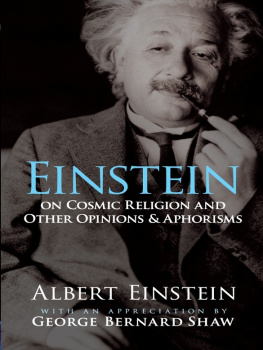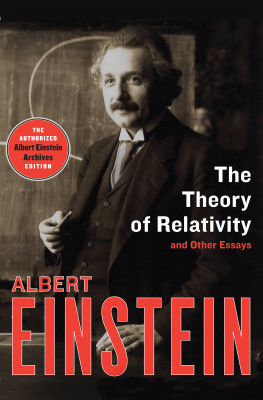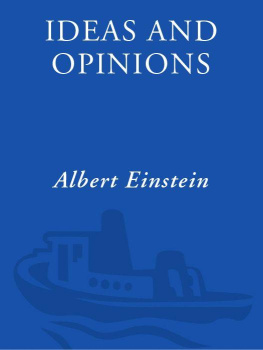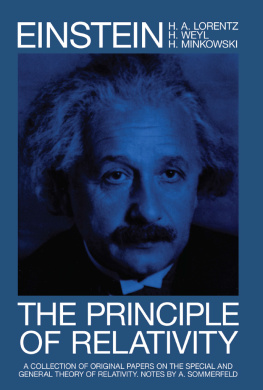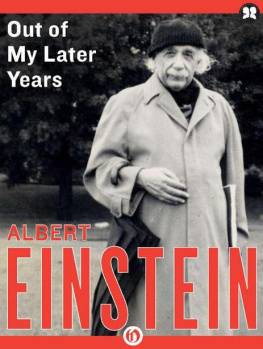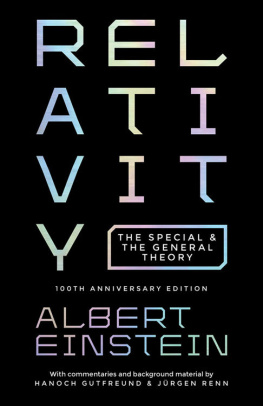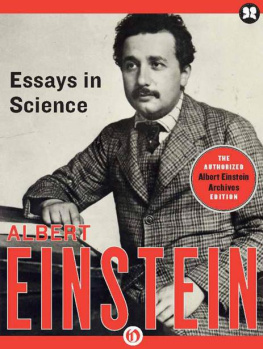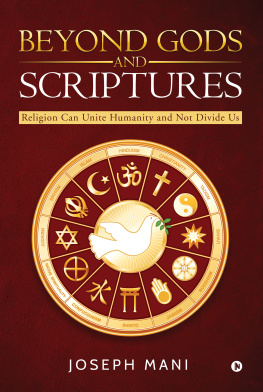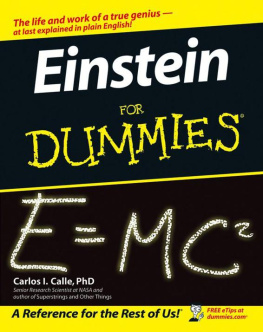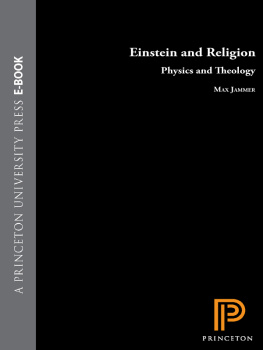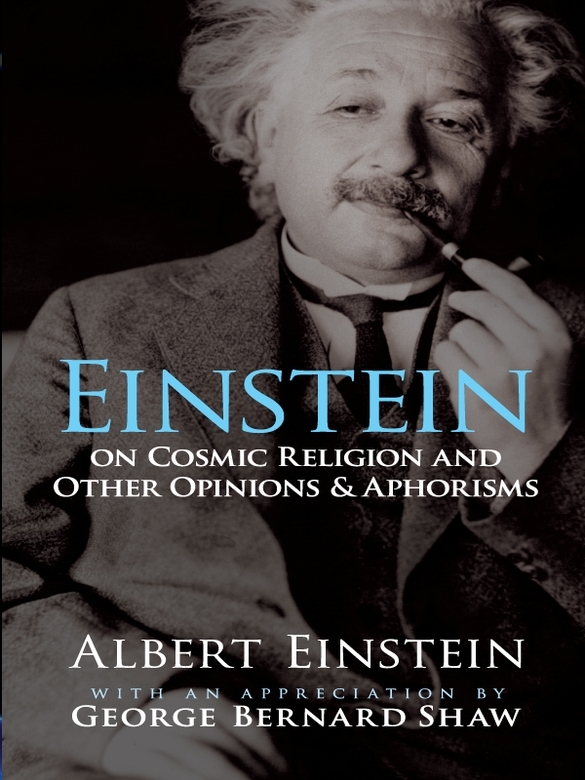GRATEFUL acknowledgment is hereby made to the New York Times Magazine for Cosmic Religion; to the Jewish Telegraphic Agency for material from its files; and to the New History Society for Militant Pacifism.
COSMIC RELIGION
COSMIC RELIGION
Everything that men do or think concerns the satisfaction of the needs they feel or the escape from pain. This must be kept in mind when we seek to understand spiritual or intellectual movements and the way in which they develop. For feeling and longing are the motive forces of all human striving and productivityhowever nobly these latter may display themselves to us.
What, then, are the feelings and the needs which have brought mankind to religious thought and to faith in the widest sense? A moments consideration shows that the most varied emotions stand at the cradle of religious thought and experience.
In primitive peoples it is, first of all, fear that awakens religious ideasfear of hunger, of wild animals, of illness, and of death. Since the understanding of causal connections is usually limited on this level of existence, the human soul forges a being, more or less like itself, on whose will and activities depend the experiences which it fears. One hopes to win the favor of this being by deeds and sacrifices, which, according to the tradition of the race, are supposed to appease the being or to make him well disposed to man. I call this the religion of fear.
This religion is considerably stabilized though not causedby the formation of a priestly caste which claims to mediate between the people and the being they fear, and so attains a position of power. Often a leader or despot, or a privileged class whose power is maintained in other ways, will combine the function of the priesthood with its own temporal rule for the sake of great security; or an alliance may exist between the interests of the political power and the priestly caste.
A second source of religious development is found in the social feelings.
Fathers and mothers, as well as leaders of great human communities, are fallible and mortal. The longing for guidance, for love and succor, provides the stimulus for the growth of a social or moral conception of God. This is the God of Providence, who protects, decides, rewards, and punishes. This is the God who, according to mans widening horizon, loves and provides for the life of the race, or of mankind, or who even loves life itself. He is the comforter in unhappiness and in unsatisfied longing, the protector of the souls of the dead. This is the social or moral idea of God.
It is easy to follow in the sacred writings of the Jewish people the development of the religion of fear into the moral religion, which is carried further in the New Testament. The religions of all the civilized peoples, especially those of the Orient, are principally moral religions. An important advance in the life of a people is the transformation of the religion of fear into the moral religion. But one must avoid the prejudice that regards the religions of primitive peoples as pure fear religions and those of the civilized races as pure moral religions. All are mixed forms, though the moral element predominates in the higher levels of social life. Common to all these types is the anthropomorphic character of the idea of God.
Only exceptionally gifted individuals or especially noble communities rise essentially above this level; in these there is found a third level of religious experience, even if it is seldom found in a pure form. I will call it the cosmic religious sense. This is hard to make clear to those who do not experience it, since it does not involve an anthropomorphic idea of God; the individual feels the vanity of human desires and aims, and the nobility and marvelous order which are revealed in nature and in the world of thought. He feels the individual destiny as an imprisonment and seeks to experience the totality of existence as a unity full of significance. Indications of this cosmic religious sense can be found even on earlier levels of developmentfor example, in the Psalms of David and in the Prophets. The cosmic element is much stronger in Buddhism, as, in particular, Schopenhauers magnificent essays have shown us.
The religious geniuses of all times have been distinguished by this cosmic religious sense, which recognizes neither dogmas nor God made in mans image. Consequently there cannot be a church whose chief doctrines are based on the cosmic religious experience. It comes about, therefore, that precisely among the heretics of all ages we find men who were inspired by this highest religious experience; often they appeared to their contemporaries as atheists, but sometimes also as saints. Viewed from this angle, men like Democritus, Francis of Assisi, and Spinoza are near to one another.
How can this cosmic religious experience be communicated from man to man, if it cannot lead to a definite conception of God or to a theology? It seems to me that the most important function of art and of science is to arouse and keep alive this feeling in those who are receptive.
Thus we reach an interpretation of the relation of science to religion which is very different from the customary view. From the study of history, one is inclined to regard religion and science as irreconcilable antagonists, and this for a reason that is very easily seen. For any one who is pervaded with the sense of causal law in all that happens, who accepts in real earnest the assumption of causality, the idea of a Being who interferes with the sequence of events in the world is absolutely impossible. Neither the religion of fear nor the social-moral religion can have any hold on him. A God who rewards and punishes is for him unthinkable, because man acts in accordance with an inner and outer necessity, and would, in the eyes of God, be as little responsible as an inanimate object is for the movements which it makes.

Science, in consequence, has been accused of undermining moralsbut wrongly. The ethical behavior of man is better based on sympathy, education, and social relationships, and requires no support from religion. Mans plight would, indeed, be sad if he had to be kept in order through fear of punishment and hope of rewards after death.
It is, therefore, quite natural that the churches have always fought against science and have persecuted its supporters. But, on the other hand, I assert that the cosmic religious experience is the strongest and the noblest driving force behind scientific research. No one who does not appreciate the terrific exertions, and, above all, the devotion without which pioneer creations in scientific thought cannot come into being, can judge the strength of the feeling out of which alone such work, turned away as it is from immediate practical life, can grow. What a deep faith in the rationality of the structure of the world and what a longing to understand even a small glimpse of the reason revealed in the world there must have been in Kepler and Newton to enable them to unravel the mechanism of the heavens, in long years of lonely work!
Anyone who only knows scientific research in its practical applications may easily come to a wrong interpretation of the state of mind of the men who, surrounded by skeptical contemporaries, have shown the way to kindred spirits scattered over all countries in all centuries. Only those who have dedicated their lives to similar ends can have a living conception of the inspiration which gave these men the power to remain loyal to their purpose in spite of countless failures. It is the cosmic religious sense which grants this power.

